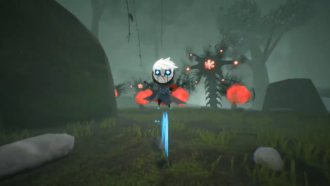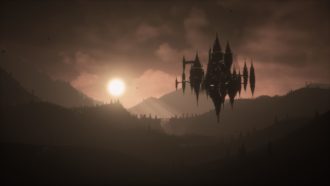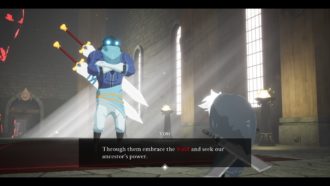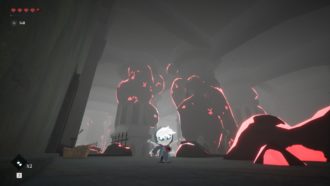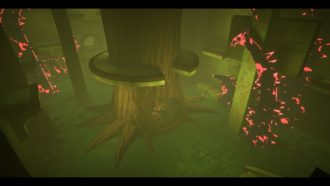Platforms:
PC, Nintendo Switch
Released:
February 4, 2021
Publisher:
Graffiti Games
Developer:
ROBI Studios
To say that Blue Fire surprised me would be an understatement. When I started the game it seemed like it was little more than a mediocre 3D platformer trying to emulate a Souls game, with a little bit of Zelda mixed in. As I continued playing though, the platforming got harder, the moveset got more robust and the environments became more and more interesting to explore.
You begin the game, awakening inside a glass tube and trapped inside a long abandoned castle filled with nasty black goop and are immediately thrust into a mission of utmost importance to help some gods to save the world from some different gods. There were a lot of proper nouns, and this is where the Dark Souls inspiration comes in.
The first area was where the game was already starting to lose me, a lot of uniform corridors and doors that all looked the same, alongside very little actual platforming or combat. The first showing of teeth is when you encounter the void. A series of platforming puzzles floating in a grey abyss. My first visit to the void was the “ah hah!” moment for me – that this was what the game was really about. The game may be dressed up like Dark Souls with an obtuse overarching plot, shrines that save your game or level up your character, and a general feeling of doom and gloom. Although at its heart, Blue Fire is a very well crafted platformer. Probably more similar to Hollow Knight than anything else, though it definitely wears its inspirations on its sleeve.
“…at its heart, Blue Fire is a very well crafted platformer“
You start the game with a jump and a dash, and for the first hour or so that is all you need. It manages to feel complex with just those abilities alone, especially in the void sections where the game’s able to break away from more logical platforming conventions and instead have breakable, floating and spinning platforms to add extra challenge. I had a lot of trouble with my first few, trying to learn how to time my jumps and dashes. Although the more I played, the easier it became.
The game offers new abilities in the same way a Zelda game offers up new items. You spend a decent amount of time in a semi-open world, dashing and jumping around the environment. Then there are Legend of Zelda style dungeons that are based more on area progression like unlocking doors or changing water levels, there is also a larger focus on enemy encounters within the dungeons. The combat is a weird mesh between Zelda and Dark Souls that doesn’t feel like it quite gets it right. It uses the classic Zelda Z-Target system, where you hop in circles around the enemy and occasionally swing at them, but enemies also knock away your health fast. Alongside that, there is also a shield you can use that bizarrely shoots you off in a random direction after you use it to block an attack, sometimes even shooting you straight off a platform and into the abyss. Definitely not the game’s strongest point.
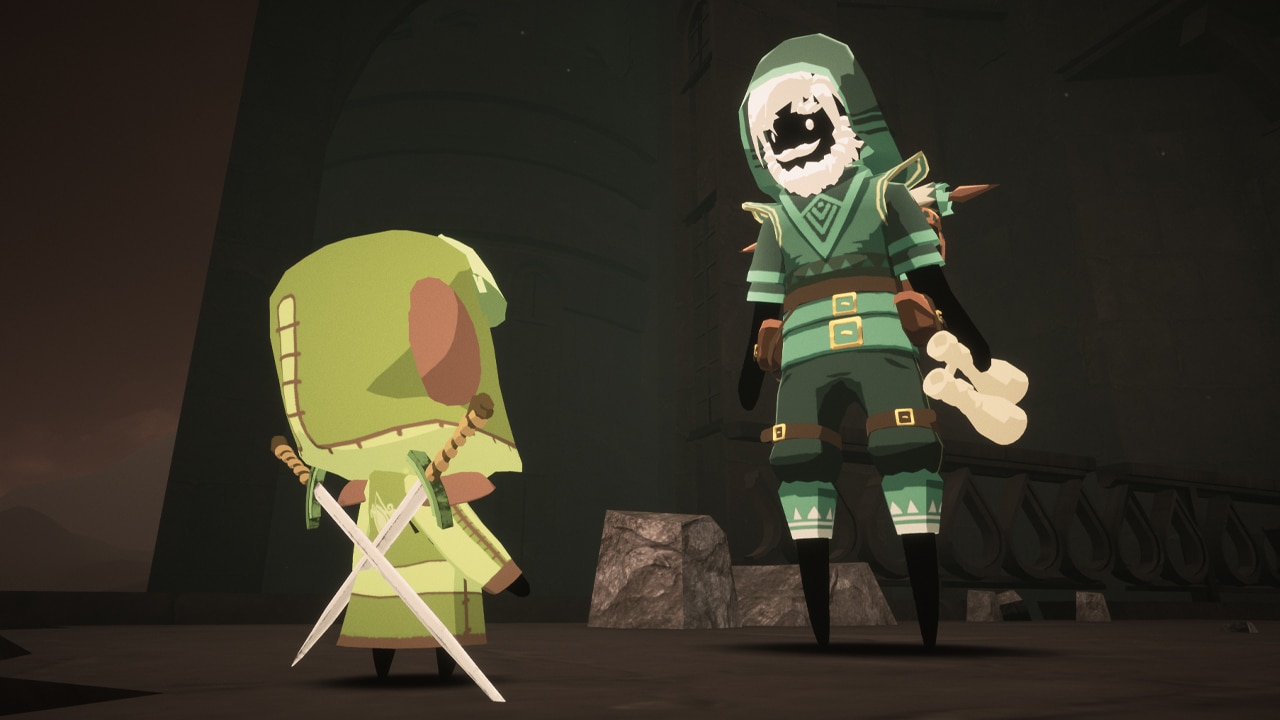
Something I really enjoyed was the characters. There are a lot of fun folks that you can chat with throughout the game, my personal favourite was a mechanic with whom I bonded over a particular fondness for elevators. We just stood there shouting “ELEVATORS, RIGHT?!” At each other for a good five minutes and it was very endearing. Most of the character interactions have a similar amount of charm and they really help to bring some vibrancy to the world.
While overall I did really enjoy my time with Blue Fire, I have a few small and not so small gripes that I need to get out of the way. First of all, any time you encounter one of the shrines at which you can save, you need to pay 1000 ore (the game’s currency) to unlock it. This is especially annoying because ore also acts how souls do in a Dark Souls game, meaning if you die and then die again without picking them up, they are lost forever. It can be mind-numbingly frustrating to finally reach a new checkpoint and then not even be able to use it. Another issue I had was sequence breaking. I quickly realised that dashing right before hitting the ground negates any fall damage, even after jumping from a high platform, and was using this while exploring the world. I had multiple occasions where I would accidentally end up in an area designed to be reached with an ability I didn’t have yet, and no way to get back again without killing myself (very annoying if I still haven’t unlocked the nearest checkpoint yet).
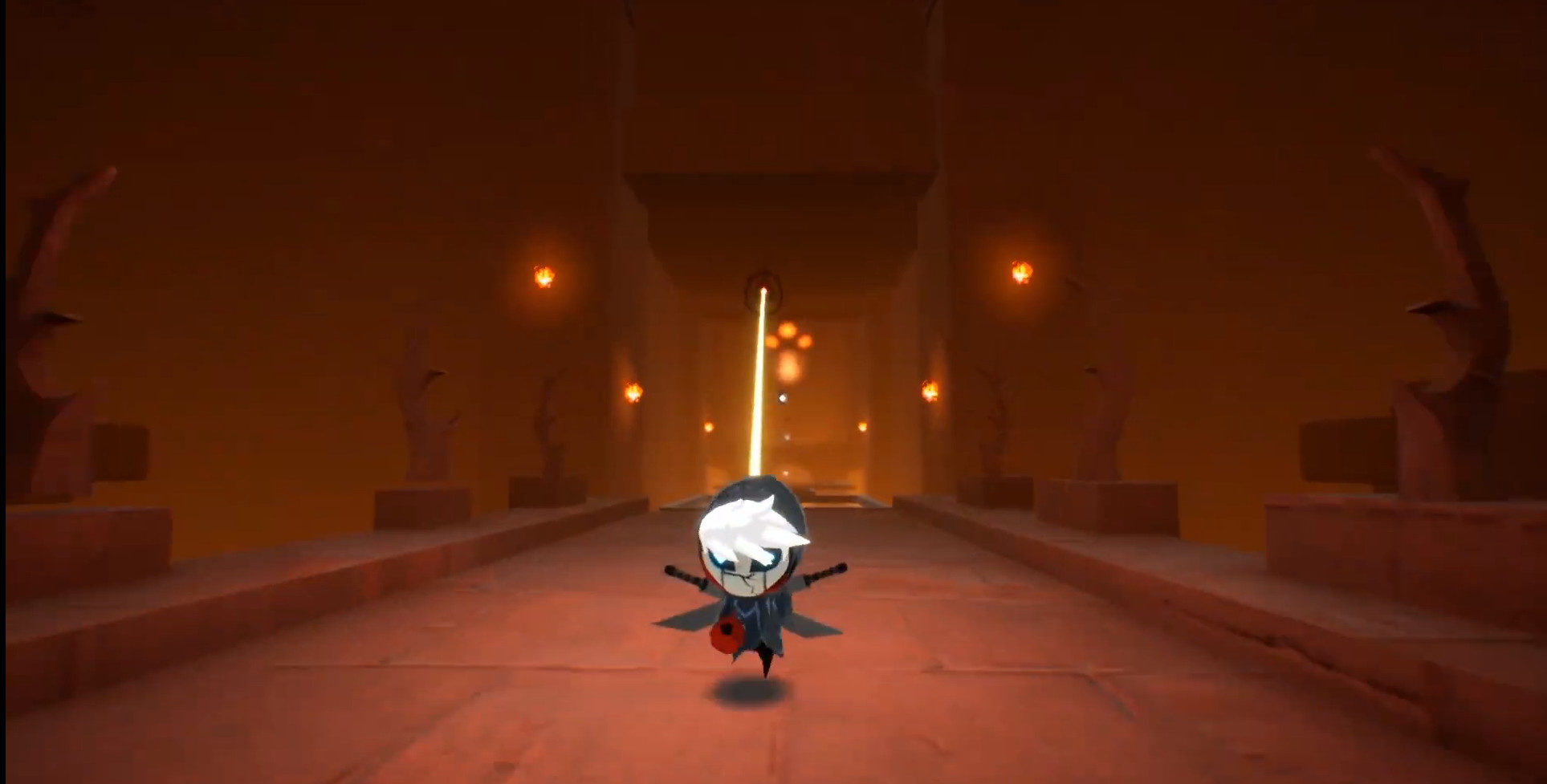
Finally, my biggest gripe is the number of times my game crashed. At many times, and seemingly without warning, Blue Fire would boot me back to the desktop and erase all progress since my last save. There is a way to save overarching progress (like inventory items or unlocked doors) but it doesn’t save your position in the world or dungeons. So the game would crash and I would be stuck back at the last shrine I visited, wherever that may be. In the end I didn’t finish the game because of this very reason. Having to re-do sections over multiple times because of crashes was not a fun experience and really brought down the good time I was having with the game.
Though there are some unpolished aspects of the game, where it really shines is its platforming. It’s fast, fluid and intelligent. The way Blue Fire integrates new mechanics is seamless and the use of the void to provide additionally platforming challenges is great. It’s a very clever way to use more outlandish platforming concepts in a way that doesn’t break any of the immersion in the game world. Learning new abilities in dungeons instead of just finding new items is smart as well, because it provides that classic Zelda progression while feeling like it is your character who is growing stronger, and all of the new abilities have plenty of uses outside of the dungeons as well.
6
Decent
Positive:
- Fluid and challenging platforming
- Interesting abilities
- Cute and talkative NPCs
Negative:
- Frequent game crashes
- Irritating save system
- Accidental sequence breaks
What Blue Fire has to offer in the platforming department is undeniably impressive. It does a great job of making simple mechanics engaging and interesting to learn while still providing a fair and balanced challenge. It is a pity that the game shows its lack of polish in some areas, especially the frequent crashes to desktop, something that is hard to forgive in a game with an already frustrating save system. Overall I would recommend giving Blue Fire a look, the gameplay is incredibly engaging and I’m sure that some of the more serious issues will be patched out in the future, so maybe keep an eye out until then.
